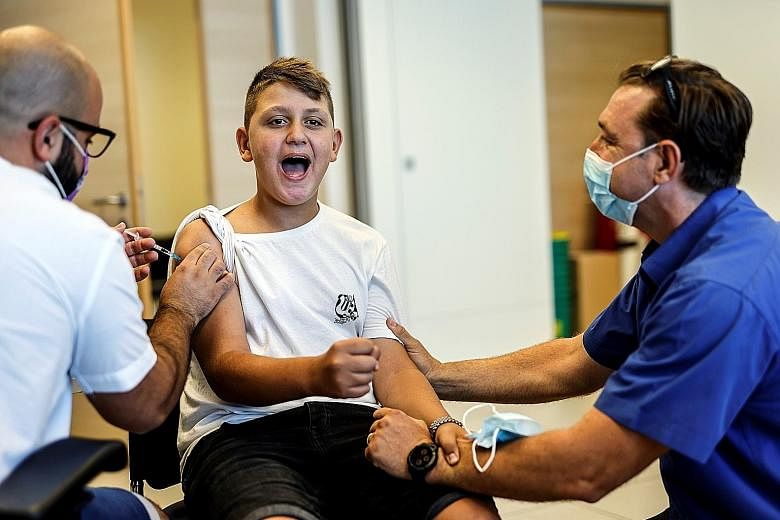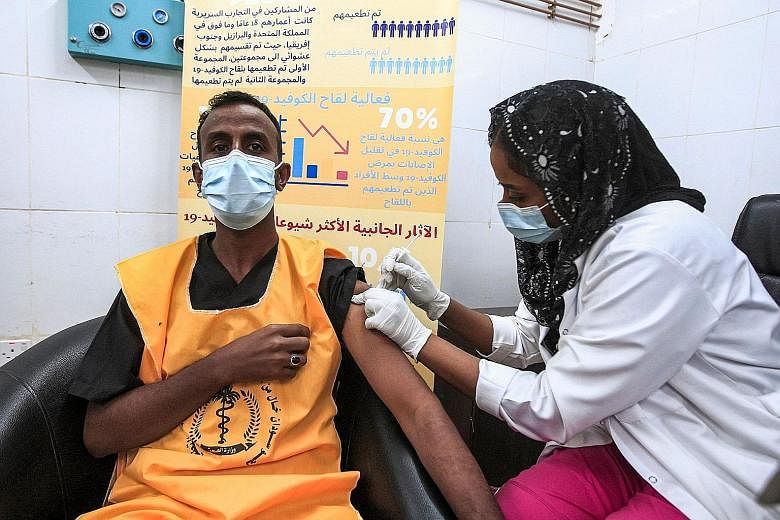British Prime Minister Boris Johnson has set a lofty challenge for the Group of Seven (G-7) countries: to ensure that the world's population is vaccinated against Covid-19 by the end of 2022.
He may be on the right track - as long as efforts to plug vaccine inequality are stepped up further.
To date, some 2.12 billion Covid-19 vaccine doses have been given across 176 countries and territories. At the current pace of 38.9 million doses a day, experts said it would take another year to achieve a high level of global immunity.
While the disease may not totally go away, getting the vaccine "may help us get to a place where Covid-19 is a significantly less lethal threat", epidemiologist Lauren Ancel Meyers, director of the University of Texas Covid-19 Modelling Consortium, told CNBC.
The rate of people getting vaccinated is steadily increasing as more vaccines are approved by health regulators, while manufacturers ramp up their production.
Some countries and territories such as Hong Kong, the Philippines and United States have dangled incentives ranging from cash and properties to even cows in an effort to overcome vaccine hesitancy among their citizens.
Israel has inoculated nearly 63 per cent of its population and this has allowed it to lift most restrictions as infections continue to fall. It will lift the need for face masks indoors from June 15.
In the US, 301 million vaccine doses have been given out as the hospitalisation rate continues to decline, with the Department of Health and Human Services reporting that only 3.17 per cent of beds were occupied by Covid-19 patients on June 4. The figure dropped from 3.67 per cent on May 28 and is the lowest since March 14 last year.
In terms of manufacturing, analytics firm Airfinity has estimated that 9.5 billion doses of Covid-19 vaccines will be produced by the end of this year. This represents nearly twice the annual global demand for all vaccines before the pandemic.
Still, the route to global immunity will be uneven and hampered by vaccine inequality.
The New York Times reported that 85 per cent of shots that have gone into arms worldwide have been administered in high-and upper-middle-income countries.
Well-to-do nations have been vaccinating large segments of their populations - including children as young as 12 - against Covid-19, a move criticised by some health experts as coming at the expense of poorer countries. By contrast, just 0.3 per cent of shots have been administered in the 29 lowest-income countries, home to 9 per cent of the world's population.
Countries such as Syria, Yemen and Sudan have barely vaccinated 1 per cent of their population. Some, like Burkina Faso and Chad, have just received their first deliveries of vaccines. But others, such as Eritrea, Burundi, North Korea, Haiti and Tanzania, have not yet received any.
Covax, a global vaccine sharing scheme backed by the World Health Organisation and the Global Alliance for Vaccines and Immunisation (Gavi), aims to secure two billion doses for lower-income countries this year.
It has delivered over 80 million Covid-19 vaccines to 129 countries and territories, with AstraZeneca making up 97 per cent of the supply and the balance being Pfizer-BioNTech.
But it faces a 200 million-dose supply gap due to disruptions in India as well as delays by other manufacturers. This is despite a shot in the arm from other countries and private donors in recent days.
The US last Thursday pledged to donate 80 million Covid-19 doses, of which 75 per cent will be disbursed via Covax.
A day earlier, dozens of countries donated nearly US$2.4 billion (S$3.2 billion) to Covax.
The funds will allow Covax to secure 1.8 billion doses for delivery to lower-income countries this year and early next year, enough to protect 30 per cent of adults in those nations.
"We have taken a big step towards 'one world protected'," said Gavi chairman Jose Manuel Barroso.
Health experts warn, however, that unless more shots are donated, the virus will continue to pose a threat to the world.
"An immediate collective commitment to pool excess supply and share the burden of responsibility could buttress vulnerable countries against becoming the next global hot spot," said Unicef executive director Henrietta Fore.
SEE WORLD




